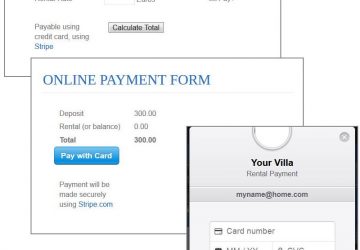There is no optimal design for a vacation rental website so you are free to explore an infinite number of possibilities. Whatever design you end up using, there are however a few key elements you should always consider.
What are you offering?
Your home page should tell you visitor exactly what you are offering. There’s nothing more annoying than have to dig into a website to find where the property is located or how many bedrooms it has.
How much does it cost?
After years of viewing website statistics it comes as no real surprise that the first thing most visitors want to know is the price. If it’s outside their budget, then there no point wasting their time any further. May your rates easy to find and avoid scaring away potential renters by asking them to “enquire for price”.
Details of the property
Make sure you have photos of every room as well as the exterior. Your visitors are trying to piece together an image of what it will be like staying there
When is it available?
Any potential guest visiting your website wants to know instantly if the properly is available. However, many owners believe that a visitor will contact them for this information. Put yourselves in their shoes. Would you be happy spending hours searching for suitable accommodation and emailing each and every one of them to see if you desired dates are available? If I find a website with no calendar, I hit the back button and go and look for something else. Make sure your website contains a calendar or other means of showing which dates are free.
Where is it exactly?
As with availability, some owners refuse to provide details of where their property is located, saying such information is a security risk.
This argument is true to some extent as burglars tend to target holiday properties when they are occupied as unsecured phones, laptops and holiday money are easy pickings. However, a burglar has easy access to 1000s of properties with occupied dates and exact locations via online listing sites and Google Maps. Restricting this information on your personal website is unlikely to deter a thief unless they've targeted your specific property and looked for your website. The money you lose by visitors leaving your website due to a lack of information could be spent on better security. You don’t need to give the exact house number or pinpoint your house to nearest meter but if I don’t know which street you’re on or how close to a main road you are, then I’m not going to make that reservation.
We therefore recommend the use of a feature such as a Google Map position.
Reassurance you are genuine
A website can be cloned in minutes and the internet is an unsafe place for many people. You may be able to save your guests 15% by booking direct but why should they trust your website?Even worse, why should they trust sending money direct to your bank account to pay for their reservation? Be sure to include information which allows you to be verified. Connections to social media or even other advertising may help. A scammer may be able to clone your website but won’t go to all the trouble of setting up other internet presences which can all be tied together. For payments offer multiple options such as credit cards so that your clients have at least some kind of protection against fraud.
 Perhaps you already advertise your holiday rental property via one, or several of the online platforms. Ideally you should also have your own website where you can not only showcase your property with unlimited restrictions but also allow direct bookings. Your guests and your business will benefit by avoiding the ever increasing advertiser fees.
Perhaps you already advertise your holiday rental property via one, or several of the online platforms. Ideally you should also have your own website where you can not only showcase your property with unlimited restrictions but also allow direct bookings. Your guests and your business will benefit by avoiding the ever increasing advertiser fees.








